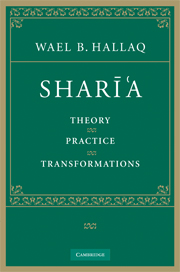Book contents
- Frontmatter
- Contents
- Preface and acknowledgments
- Introduction
- Part I The pre-modern tradition
- Part II The law: an outline
- 6 The legal pillars of religion
- 7 Contracts and other obligations
- 8 Family law and succession
- 9 Property and ownership
- 10 Offenses
- 11 Jihād
- 12 Courts of justice, suits and evidence
- Part III The sweep of modernity
- Appendix A Contents of substantive legal works
- Appendix B Chronology
- Bibliography
- Index
7 - Contracts and other obligations
Published online by Cambridge University Press: 05 June 2012
- Frontmatter
- Contents
- Preface and acknowledgments
- Introduction
- Part I The pre-modern tradition
- Part II The law: an outline
- 6 The legal pillars of religion
- 7 Contracts and other obligations
- 8 Family law and succession
- 9 Property and ownership
- 10 Offenses
- 11 Jihād
- 12 Courts of justice, suits and evidence
- Part III The sweep of modernity
- Appendix A Contents of substantive legal works
- Appendix B Chronology
- Bibliography
- Index
Summary
Contractual principles in general
Constitutive features
In fiqh, contracts do not stand as a separate category, in the manner, say, American or French law articulates them in textbooks and treatises. Rather, Islamic conceptions of contract are implicit in juristic discussions pertaining to pecuniary and commercial transactions, among others. They are constituted by three essential elements (arkān; sing. rukn), namely: (a) the parties; (b) the form (ṣīgha) of offer and acceptance; and (c) the object, or subject-matter. The Ḥanafites held form to be the only essential element, as the acts of offer and acceptance presuppose the presence of both the parties and the subject-matter.
(a) The contracting parties: A person qualified to enter into a contract on behalf of oneself or another must be of major age (bāligh) and have attained rushd, namely, the capacity to behave in a responsible and constructive manner (muṣliḥan), and without this capacity being subject to interdiction (ḥajr). Minors and the insane cannot enter into a contract without a guardian acting in their interest, except for discerning minors (mumayyiz) who can, inter alia, receive gifts and be the beneficiaries of a waqf.
(b) Offer and acceptance (ījāb and qabūl): The majority of jurists associate offer with the owner (mālik) of the object, and acceptance with the party to whom ownership or possession of that object (or usufruct) is transferred.
- Type
- Chapter
- Information
- Sharī'aTheory, Practice, Transformations, pp. 239 - 270Publisher: Cambridge University PressPrint publication year: 2009



